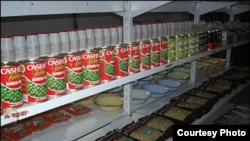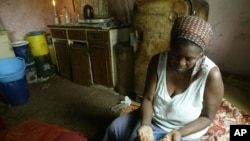WASHINGTON DC —
The Zimbabwe Congress of Trade Unions (ZCTU) says the majority of Zimbabweans are earning wages as low as $50 a month, a situation that has almost reduced them to beggars as some of them now live on one meal a day.
Hundreds of bread winners lose jobs every day, forcing them to resort to unconventional ways of making money such as corruption and prostitution. But there are others who have taken advantage of massive jobs losses to make a decent living in a nation where poverty levels are as high as 63 percent.
It is no longer surprising in Zimbabwe to find a teacher moonlighting in a non-governmental organization or even conducting private lessons in order to supplement his income. Teachers netting about $300 a month may be in a better position than factory workers who hardly make $100 per month.
The struggle for survival has become part of life in a country once considered worldwide as Africa’s breadbasket.
Bulawayo-based tourism consultant, Zifiso Masiye, believes that political bickering among parties in the unity government has resulted in the near decimation of the working class.
“You are more of a potential worker in Zimbabwe today than you are a worker because you are talking about extremely high levels of unemployment, desolate industries, retrenchments, and low levels of wages and salaries for workers … and a short and brutish life for an employee and potential employee. There is no real employment to talk about in this country,” he said.
He said the country is recovering from several years of economic decline and as a result “you cannot expect that we compete with the region or indeed the world.”
“The salaries are still barely reflective of what they were years ago but there has been some measure of respite courtesy of the government of national unity. But there is also a lot of uncertainty that came with the government of national unity with a lot of disagreements between this minister from this party and the other minister.
“This is why you will find the principals are so happy to come towards an election that will get rid of that arrangement and maybe come up with a clearer policy on employment and wages.”
However, he says workers are still insecure though the job market improved after the formation of the unity government in 2009. This is due to the large number of retrenchments and company closures.
According the ZCTU, between 5,000 and 6,000 workers lost their jobs in 2012 and more than 8,000 are expected to be jobless this year. Less than 500,000 people are believed to be in the formal job sector.
For Mr. Masiye, this is an indication that the Zimbabwe economy cannot sustain high wages in a country with 12.9 million people.
The situation is worse for unemployed Zimbabweans like Linda Mpofu of Gwanda, who only survives on what she calls piece jobs offered by non-governmental organizations.
“Life is quite difficult because you have nowhere to get a dollar. No money to buy food. All you have to do is to follow non-governmental organizations with the hope that maybe they have got a few piece jobs like organizing workshops or writing reports. If there is nothing then one does not eat," she said.
Like most unemployed people, she has almost lost hope of getting a decent job.
She says some employed Zimbabweans end up getting involved in armed robberies, illegal gold panning, corrupt activities and prostitution in an effort to make a living.
“Most people get between $250 and $300 a month. The poverty datum line is about $675 if I am not mistaken. So, definitely it’s difficult for people to actually live under such circumstances. That’s why most people end up going to do illegal gold panning and recently in Gwanda we have seen an upsurge of commercial sex workers and we’ve also experienced some robberies meaning that maybe it’s because people cannot live within their means. So they are trying to look for a way to give them more money, said Ms. Mpofu.
But some people who lost their jobs have successfully ventured into the informal sector where over 2 million people produce various goods. Some of them have become successful business persons and merchants.
Roita Matava of Harare’s Mabvuku high density suburb, who produces an assortment of leatherwear at his home and sells it in the lucrative South African market, says the informal sector has changed his life.
“I am just self-employed. To earn a living right now, I am in the leather industry. I make some handbags, leather shoes, wallets and at the end of the day I sell them in South Africa. I can get something like between R10,000 and $15,000 per month,” said Mr. Matava.
Mr. Matava’s only fear is that his income can be eroded by a high rate of inflation.
Zimbabwe recorded historic hyperinflation rates between 2000 and 2008 before the formation of the unity government. The country introduced a multiple currently system in 2009 which observers say stabilized the economy.
Despite this positive economic outlook, workers are struggling to make ends meet.
Hundreds of bread winners lose jobs every day, forcing them to resort to unconventional ways of making money such as corruption and prostitution. But there are others who have taken advantage of massive jobs losses to make a decent living in a nation where poverty levels are as high as 63 percent.
It is no longer surprising in Zimbabwe to find a teacher moonlighting in a non-governmental organization or even conducting private lessons in order to supplement his income. Teachers netting about $300 a month may be in a better position than factory workers who hardly make $100 per month.
The struggle for survival has become part of life in a country once considered worldwide as Africa’s breadbasket.
Bulawayo-based tourism consultant, Zifiso Masiye, believes that political bickering among parties in the unity government has resulted in the near decimation of the working class.
“You are more of a potential worker in Zimbabwe today than you are a worker because you are talking about extremely high levels of unemployment, desolate industries, retrenchments, and low levels of wages and salaries for workers … and a short and brutish life for an employee and potential employee. There is no real employment to talk about in this country,” he said.
He said the country is recovering from several years of economic decline and as a result “you cannot expect that we compete with the region or indeed the world.”
“The salaries are still barely reflective of what they were years ago but there has been some measure of respite courtesy of the government of national unity. But there is also a lot of uncertainty that came with the government of national unity with a lot of disagreements between this minister from this party and the other minister.
“This is why you will find the principals are so happy to come towards an election that will get rid of that arrangement and maybe come up with a clearer policy on employment and wages.”
However, he says workers are still insecure though the job market improved after the formation of the unity government in 2009. This is due to the large number of retrenchments and company closures.
According the ZCTU, between 5,000 and 6,000 workers lost their jobs in 2012 and more than 8,000 are expected to be jobless this year. Less than 500,000 people are believed to be in the formal job sector.
For Mr. Masiye, this is an indication that the Zimbabwe economy cannot sustain high wages in a country with 12.9 million people.
The situation is worse for unemployed Zimbabweans like Linda Mpofu of Gwanda, who only survives on what she calls piece jobs offered by non-governmental organizations.
“Life is quite difficult because you have nowhere to get a dollar. No money to buy food. All you have to do is to follow non-governmental organizations with the hope that maybe they have got a few piece jobs like organizing workshops or writing reports. If there is nothing then one does not eat," she said.
Like most unemployed people, she has almost lost hope of getting a decent job.
She says some employed Zimbabweans end up getting involved in armed robberies, illegal gold panning, corrupt activities and prostitution in an effort to make a living.
“Most people get between $250 and $300 a month. The poverty datum line is about $675 if I am not mistaken. So, definitely it’s difficult for people to actually live under such circumstances. That’s why most people end up going to do illegal gold panning and recently in Gwanda we have seen an upsurge of commercial sex workers and we’ve also experienced some robberies meaning that maybe it’s because people cannot live within their means. So they are trying to look for a way to give them more money, said Ms. Mpofu.
But some people who lost their jobs have successfully ventured into the informal sector where over 2 million people produce various goods. Some of them have become successful business persons and merchants.
Roita Matava of Harare’s Mabvuku high density suburb, who produces an assortment of leatherwear at his home and sells it in the lucrative South African market, says the informal sector has changed his life.
“I am just self-employed. To earn a living right now, I am in the leather industry. I make some handbags, leather shoes, wallets and at the end of the day I sell them in South Africa. I can get something like between R10,000 and $15,000 per month,” said Mr. Matava.
Mr. Matava’s only fear is that his income can be eroded by a high rate of inflation.
Zimbabwe recorded historic hyperinflation rates between 2000 and 2008 before the formation of the unity government. The country introduced a multiple currently system in 2009 which observers say stabilized the economy.
Despite this positive economic outlook, workers are struggling to make ends meet.


















